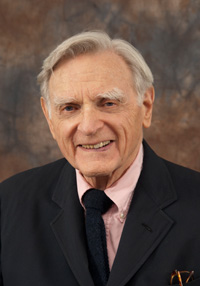Brief bio

John B. Goodenough is the Virginia H. Cockrell Centennial Professor of Materials Science and Engineering at The University of Texas at Austin. In 2019, Dr. Goodenough was a co-recipient of the Nobel Prize in Chemistry for the development of lithium-ion batteries. He is known for his contributions to the understanding of d-electron behavior in transition-metal oxides. While developing the ferromagnetic-oxide memory element of the first random-access memory of the digital computer, Goodenough discovered numerous properties intrinsic to transition-metal compounds. These properties include cooperative orbital ordering in solids, now referred to as a cooperative Jahn-Teller distortion, the Goodenough-Kanamori rules for the sign of interatomic spin-spin interactions, which dictate magnetic superexchange in oxides, the origin of metallic d electrons in oxides, which explained metallic conduction in oxide perovskites that are used as catalytic cathodes in solid oxide fuel cells, and the character of the lattice instabilities at the crossover from localized to itinerant d-electron behavior, which manifest as charge-density waves and high-temperature superconductivity in the copper oxides. Using the expertise he garnered in transition-metal oxides, Goodenough shifted his focus to working on renewable energy materials. This switch led him to develop the critical cathode material, LiCoO2, that enabled a practical lithium-ion battery and kickstarted the wireless revolution. He has since gone on to create and study many essential framework materials for lithium, sodium, and potassium batteries that remain subjects of intense research to this day.
Goodenough received a B.A. in Mathematics from Yale University in 1943. He subsequently served in the USAAF during World War II as a meteorologist before obtaining an M.S. and Ph.D. in Physics from the University of Chicago under Clarence Zener in 1951 and 1952, respectively.
Professor Goodenough is a member of the U.S. National Academies of Engineering, Sciences, and Inventors; a Foreign Associate of L’Academie des Sciences de L’Institute de France, Academia de Ciencas Exactas, Fisicas y Naturales of Spain, and the Royal Society (UK). His awards include Laureate of the Japan Prize (2001), the Presidential Enrico Fermi Award (2009), the National Medal of Science (2012), the Charles Stark Draper Prize of the National Academy of Engineering (2014), Thomson Reuters Citation Laureate (2015), the Eric and Sheila Samsun Prime Minister’s Prize for Innovation in Alternative Fuels for Transportation (2015), Copley Medal of the Royal Society (2019), Nobel Prize in Chemistry (2019), and Washington Award (2020).
His publications include Magnetism and the Chemical Bond (1967), Les oxydes des métaux de transition (1973), Witness to Grace (2008), and (with Kevin Huang) Solid Oxide Fuel Cell Technology: Principles, Performance, and Operations (2009); 94 book chapters and reviews, and over 1000 refereed journal articles.

